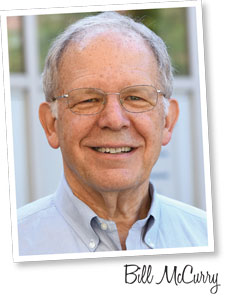1/1/2024
New Year’s Resolutions? Bah, Humbug!
Bill McCurry

Let’s kill the myth that New Year’s resolutions, which rarely make it to February, help you improve your weaknesses and lead you to greatness. Over the recent decades several informed voices are reaching different conclusions: “You can get good by improving your weaknesses, but get great by improving your strengths.”
Sports stories can illustrate this. None is probably greater than Minnesota Twins pitcher Jim Kaat. As a young pitcher, Kaat had a solid fastball, but he wanted to improve his curve ball, screwball and other pitches. Under the tutelage of pitching coach Johnny Sain, Kaat was told to throw fastballs during training. Then throw more fastballs during more training. Kaat became a master at the game, throwing fastballs and winning ball games over decades of play, then coaching and broadcasting. It was by constant improvement of his best strength that Kaat became a record-setting Hall of Famer.
Today, academics and career coaches are finally seeing we’re better able to grow and learn when we enjoy what we’re doing. If it’s fun for us, we’re motivated to continue while overcoming any temporary setbacks. Success builds future successes. If we consider it a chore or “something we’re not good at,” then our success rate plummets, bringing with it continued defeats and negativity. When we’re successful with a job skill improvement it spreads to other aspects of our life. It generates more successes, which self-generate even more success. It’s the leverage and momentum of our personal growth.
When we slog through learning things we dislike or aren’t favorably disposed to, we get discouraged. That slows our forward progress in everything. We also learn more quickly which things are built on our existing knowledge.
What if your organization needs the skills at which you don’t excel? Delegation is the likely answer. One universal worry with delegation is that the job won’t be done as well as you’d do it yourself. Look at that logically for a minute. If you don’t like to do it, and you don’t feel confident doing it, how well will you do it? Would delegating the task to someone who loves that type of work really be worse than if you did it poorly yourself? People who like to do certain tasks do them faster and better than those who don’t like those jobs.
Wrestling with weaknesses can be a demotivating, dangerous, sometimes fatal, condition for anyone in a management role. A slight improvement in a weakness may take hours of exhaustive work, while increasing a strength could be easier and yield more significant results. Think of it this way—a weakness may be 10% of your total output. A 1% increase in total output could take immense energy and emotion, but only net you 11%. If you take something already at 50% and increase it 1%, that gets you a gain of 5% and now you’re at 55%. Building on a stronger base always equals stronger results.
In Malcolm Gladwell’s book “Outliers,” he popularized the rule:10,000 hours of practice creates mastery of a specific role. This was apparently Gladwell’s interpretation of Professor Anders Ericsson’s work at Florida State University. However, the professor refutes Gladwell’s conclusion, saying it’s only “a popularized, but simplistic, view of our work.” The 10,000 hours was an average of the time elites spent practicing. Then there’s the whole question of quantity versus quality of that practicing.
Consider the impact your improved strengths make on your team. Likely each team member has different strengths and weaknesses. Can each of them improve their strengths? When the entire team skill set is inventoried, are there skills you need that are missing? Can they be recruited or can existing team members learn to love, embrace and improve on them?
Don’t waste time on quickly broken resolutions. Let your strengths and those of your team members rise to the occasion. Make 2024 your most effective year yet.
Happy New Year! GP
Bill would love to hear from you with questions, comments or ideas for future columns. Please contact him at wmccurry@mccurryassoc.com or
(609) 731-8389.